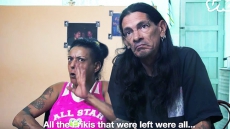In Rwanda, Canadian expat Barrett Nash says you don't need a morning coffee if you take a taxi to work. That's because most taxis are motorcycles and riding on one gives you enough adrenaline to wake right up.
But three years ago, after Nash and his Kenyan colleague Peter Kariuki got in a serious crash while riding a motorcycle taxi, they came up with an idea: an Uber-like business called SafeMotos, with a focus on guaranteeing safe drivers.
Motorcycle taxis — dubbed motos by Rwandan locals — are a common way to get around in the small African country, frequently used over five times day. But they're also often considered risky by locals.
"You could always tell immediately if the driver is a good driver or a bad driver," said Nash, who came to Rwanda in 2010 to work for an NGO that provides laptops to schoolchildren.
The 29-year-old from British Columbia said his business employs moto drivers who can be ordered through the SafeMotos app to take users around Kigali, Rwanda's capital.
The business is one of the first ride-hailng startups in the country, Nash said, and business has ramped up quickly. In 2015 it clocked in around 5,000 trips, he said. By 2016, it hit 80,000 trips, and just halfway into 2017, it has already recorded 120,000 trips.
But in addition to allowing users to book rides, the app also uses smartphones to track how safely moto drivers ride, Nash explained.
By using existing motion sensors in the smartphones carried by the drivers, SafeMotos can track how drivers accelerate and brake, similar to how some insurance companies use a dashboard device to monitor how safely their clients drive, Nash said.
Now, to further expand the business, the company is planning to unveil a new feature: free rides for certain situations. Restaurants and businesses are offering to pay for users' rides to and from their business as a way to lure more customers in.
Nash admits it's not a model that would work in most places, but it makes sense in Kigali.
Rwanda has a transportation system vastly different from Canada's. While buses between cities can sometimes approach Canadian standards, inner city travel is a different story.
Public bus systems are often non-existent, thanks to the hilly nature and unorganized structure of city roads. Instead, Rwandans get around by motos multiple times a day.
This is largely possible because rides that would cost $30 or $40 in Canada often costs as little as $1 in Rwanda. Nash said restaurants are willing to pay the small amount to get a customer to their establishment where they would spend much more.
SafeMotos is currently testing the feature — called FreeMotos — with select restaurants.
Nash's inspiration for the idea didn't come from Rwanda though, it came from where his mother did groceries in Vancouver.
"She'd go to this specific store because it was paid parking, but they'd reimburse her for her parking," Nash explained. "It was interesting because she would make a big financial decision for the week based on a small nudge."
Nash hopes the app's new feature can help restaurants fill tables on slow nights and also draw in more expat users, who currently only account for 15 per cent of the service's user base.
For some who've already tried the app, using SafeMotos is starting to become routine.
Divin Ntamvutsa, a graphic designer in Kigali, said he has been using the service since it launched, and now uses it as many as six times a day.
"The app is getting very popular," said Ntamvutsa. "When I go to work or go home, I notice people actually using the app."
Isimbi Nsinga Sylvia, a 26-year-old university student in Kigali, said she now uses the app over five times a day after first hearing about it on social media a year ago.
The idea of free rides to go to particular restaurants resonated with her.
"Of course I would be interested," she said. "A free moto? Why not?"





